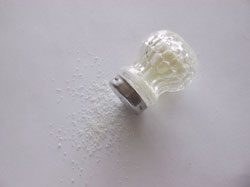
Related
Top stories




Marketing & MediaAds are coming to AI. Does that really have to be such a bad thing?
Ilayaraja Subramanian 21 hours


More news
















Salt is an integral part of our daily lives. Most of us would agree that food without salt is usually less palatable. In ancient times, salt was regarded as a luxury item and was limited to the nobility, but nowadays, it is a cheap and easily accessible ingredient which is added to flavour most prepared or packaged foods.
Salt plays an important physiological role in the body and regulates water homeostasis. However, over-exposure to salt may cause or aggravate diseases such as hypertension (high blood pressure), heart failure and kidney conditions.
"Conversely, too little salt is also not a good thing. The rule of thumb is never to add additional salt to food and restrict the intake of highly processed food (such as meat products) which has a high salt content," says Prof Jacques Snyman from Resolution Health Medical Scheme.
"Patients suffering from high blood pressure, heart failure and kidney diseases need to consult their doctors to establish the correct salt intake as this may differ from patient to patient and is also influenced by the type of medication prescribed to treat the condition."
Of great concern, says Prof Snyman, is an analysis in The Lancet by researchers at Tulane University School of Public Health and Tropical Medicine in New Orleans which found that hypertension is on the increase globally and by the year 2025, approximately 1 in 3 adults aged over 20 years - or 1.56 billion people worldwide - will have hypertension.
The study showed that overall, 26.4% of the world's adult population in 2000 had hypertension (26.6% of men and 26.1% of women). In general, the prevalence of hypertension among younger persons was higher among men than women, but among older individuals (>60 years), it was higher in women. Based on the estimates for 2000, the researchers calculated that by 2025, the number of adults with hypertension will increase by about 60%. This means that 29.2% of adults worldwide (29.0% of men and 29.5% of women) will have hypertension by 2025.
"Hypertension is a silent killer as it is a risk factor for almost all cardiovascular conditions. It aggravates or can be the sole cause of heart failure; accelerates the development of atherosclerosis (narrowing of arteries) which may result in a heart attack and is the single biggest contributor to stroke," says Prof Snyman.
Hypertension is a lifestyle illness and can be mostly prevented by changing the way you live and what you eat.
A low salt diet can reduce blood pressure by 10mmHg, i.e. similar to what can be achieved by the average blood pressure lowering drug. Patients suffering from high blood pressure can enhance the blood pressure lowering effect of their medicine and even control their disease by simply making lifestyle modifications.
"Apart from reducing the amount of salt in your diet, exercise and weight reduction can also further reduce blood pressure by 10mmHg making medical treatment unnecessary in some mild cases of hypertension," says Prof Snyman. "All too often, we rely on medicine to do the trick without investing any effort from our side in terms of changing the way we live."
The following lifestyle adjustments will go a long way towards helping prevent or manage hypertension:
So is salt really off limits?
Generally, individuals with a healthy blood pressure should limit the sodium in their diet to 2300mg per day, while those with high blood pressure should limit the sodium in their diet to 1500mg per day. However, your doctor may tell you to restrict your salt intake even more.
"Remember, salt is an acquired 'taste' and over time, you may need more to get the same 'taste' which in itself increases the amount of salt ingested and puts you on the road to a hypertension risk," Prof Snyman says.
Make a decision today to change the way you view your salt intake and taste real food - and live a healthier life, or you could be at risk of becoming a statistic.